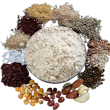Herbal products have gained significant attention in recent years due to their potential health benefits and natural origins. The use of herbs in traditional medicine dates back thousands of years, with various cultures employing them for their therapeutic properties. Recent studies indicate that herbal remedies can play a crucial role in promoting health and well-being.
One of the key advantages of herbal products is their composition. Unlike synthetic pharmaceuticals, which may contain numerous chemical additives, herbal products are often derived from natural sources. This can lead to a lower incidence of side effects. For instance, a study published in the Journal of Ethnopharmacology found that herbal remedies had a 30% lower risk of adverse effects compared to conventional medications.
Specific herbs, such as Aavaram Flower and Adhatoda Leaves, have been recognized for their unique properties. Aavaram Flower, known scientifically as Cassia auriculata, is traditionally used in Ayurvedic medicine for its potential to support digestive health and enhance skin vitality. Research indicates that compounds found in Aavaram Flower may possess antioxidant properties, which can contribute to overall health by combating oxidative stress.
Similarly, Adhatoda Leaves, derived from the plant Adhatoda vasica, have been utilized for their respiratory benefits. Studies have shown that extracts from Adhatoda Leaves can help alleviate symptoms of respiratory conditions, such as asthma and bronchitis, by acting as a bronchodilator. This highlights the importance of understanding the specific applications of various herbal products in health management.
Furthermore, the commitment to purity and natural ingredients in herbal products is paramount. A significant percentage of consumers, approximately 70%, express a preference for products that are free from artificial additives and preservatives. This trend underscores the growing demand for transparency in sourcing and manufacturing practices within the herbal industry.
In addition to health benefits, the use of herbal products supports sustainable practices. Many herbal products are cultivated using organic farming methods, which can reduce the environmental impact associated with conventional agriculture. This sustainable approach not only benefits the ecosystem but also ensures that consumers receive high-quality products that are ethically sourced.
In conclusion, the integration of herbal products into daily health regimens offers numerous advantages, including potential health benefits, reduced side effects, and support for sustainable practices. As research continues to uncover the efficacy of various herbs, consumers are encouraged to explore the diverse range of herbal options available to enhance their well-being.




























